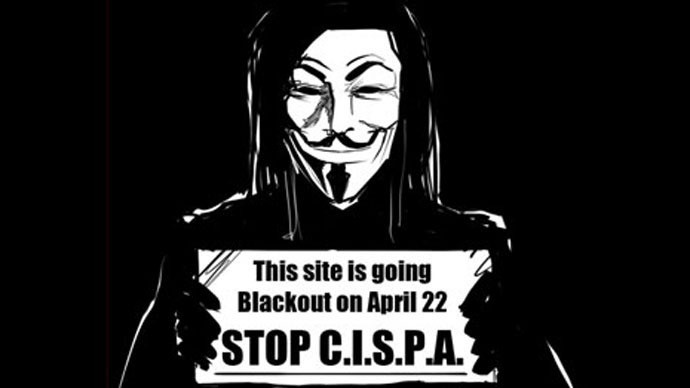Anonymous CIPSA Blackout Campaign Fails
Anonymous calls for widespread website blackouts in protest against the controversial CISPA bill in the US have fallen on deaf ears.

On 18 January, 2012 hundreds of websites went black in protest at the Stop Online Piracy Act (SOPA) Protest IP Act (PIPA) including high profile domains such as Google, Wikipedia, Reddit and WordPress.
Fast forward 16 months and online hactivist collective Anonymous was hoping it could get a similar response to the proposed Cyber Intelligence Sharing and Protection Act (CISPA) which passed through the House of Representatives last week.
However, despite the hashtags #CISPABlackout and #StopCISPA trending briefly on Twitter on Monday, the movement has failed to gain major traction with the vast majority of internet users barely noticing any impact.
While Anonymous has collated a list of hundreds of websites which have gone black for the day, the list doesn't contain any major internet domains such as those which took part in the SOPA protest.
The problem is that most major technology companies such as Apple, Google, Yahoo and Microsoft all support the CIPSA legislation in its current form, and therefore widespread and high profile action for this blackout was always going to be tough.
Voted down
CISPA is designed to help prevent and defend the US against all manner of cyber-security threats at a time when cyber-espionage is rife and the threat of an all-out cyber-war is on the horizon. It allows for private companies who collect sensitive customer information to share that with other companies and the US government - without the need for a warrant.
This is the second time around for the CISPA legislation. Having passed through the House of Representatives in April 2012 first time around, it was voted down in the Senate. The new bill has been modified slightly but those campaigning against it say the modifications do not go nearly far enough.
The loudest voices against the bill are coming from the likes of Mozilla and the Electronic Frontier Foundation (EFF) which called the bill "dangerous" because it "carves a loophole in all known privacy laws and grants legal immunity for companies to share your private information."
A petition seeking to stop CISPA has received over 800,000 signatures but this likely to have little effect on the progress of the bill.
One voice which could prevent CISPA from progressing however is President Obama, who clearly indicated reservations with the bill:
"The Administration remains concerned that the bill does not require private entities to take reasonable steps to remove irrelevant personal information when sending cyber-security data to the government or other private sector entities. Citizens have a right to know that corporations will be held accountable - and not granted immunity - for failing to safeguard personal information adequately."
© Copyright IBTimes 2025. All rights reserved.






















